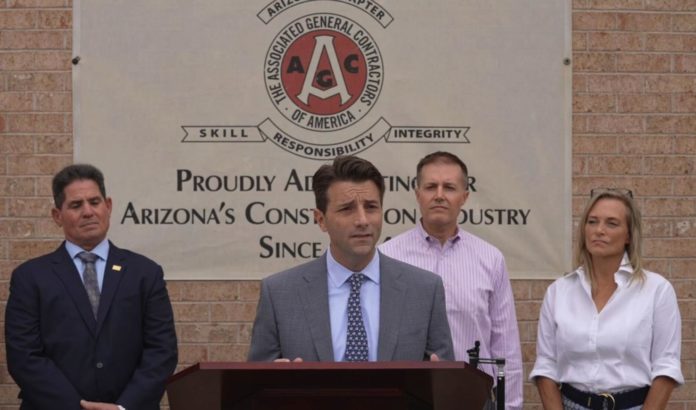
Arizona’s business leaders say labor legislation awaiting consideration in the U.S. Senate would cause a seismic shift in labor-employer relations, nullifying many aspects of state law employers look for when considering relocation.
Associated General Contractors Arizona chapter President David Martin praised Arizona Democratic U.S. Sens. Kyrsten Sinema and Mark Kelly for their “pragmatic approach” on the Protecting the Right to Organize (PRO) Act of 2021. He pressured President Joe Biden to keep his promise to be an “inclusive president.”
“The PRO act prohibits employers’ ability to communicate with employees during an organizing drive,” Martin said Monday during a news conference. “It allows private info on employees to be provided to the union, allows strikes at any time and for any reason.”
The U.S. House passed PRO Act on March 9 along partisan lines. A similar version passed from the House in 2020 but was rejected by the Republican-controlled Senate.
Several states already have laws that implement much of the bill, meaning the PRO Act would force more business-friendly states to adopt the act’s labor-friendly policies.
“The PRO Act is a harmful bill that would, essentially, give unions free rein to wreak havoc on local businesses by lifting limitations picketing and causing economic injury to third parties,” said Michelle Ahlmer, executive director of the Arizona Retailers Association.
One of the most significant changes contained in the PRO Act strikes right-to-work laws at the state level. Right-to-work laws ban union membership as a condition of employment.
Arizona and 26 other states have right-to-work laws pertaining to the private sector. The U.S. Supreme Court ruled in 2018 that public-sector right-to-work laws were a violation of free speech.
“We know that right-to-work states typically outperform non-right-to-work states with higher job growth, lower unemployment rates, and better economic output,” Arizona Chamber of Commerce and Industry President and CEO Danny Seiden said.
The AFL-CIO and its 56 labor organizations wrote Kelly on Aug. 3, pressuring him to support the PRO Act.
“The US is falling behind on numerous fronts, and our labor protections are no exception,” the union wrote. “Workers need you now to show your support for the right to organize.”
The AFL-CIO told Kelly the PRO Act would give workers “a voice at the table to bargain for better wages, retirement, health and safety standards, and other vital benefits.”
By Cole Lauterbach | The Center Square













